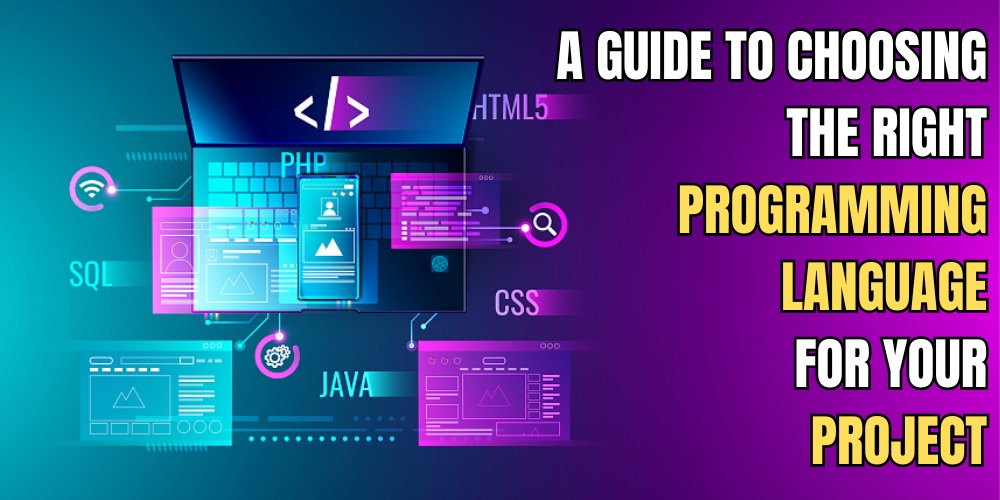-
+91 96679 49121
A Guide to Choosing the Right Programming Language for Your Project

A Guide to Choosing the Right Programming Language for Your Project
Opting for the right programming language for a project depends on multiple factors, including project requirements, team proficiency, conduct reviews, and durable sustainability. Here’s a guide to help you decide on the right language:
1. Understand the Project Requirements
• What type of application are you working on? Is it a mobile application, web application, desktop software, embedded system, or data-driven application?
• Check if the project requires high performance, low dormancy, or immediate operation.
• Verify the platform and ecosystem. Is the application meant to run on specific platforms (e.g., Apple iOS, Android, Windows, Linux) or cross-platform?
• Will the application need to manage a huge number of consumers or data? Consider the configurability needs.
2. Consider Your Team’s Adeptness
• What is the skillset your team acquires? Does your team already have excellence in a particular language or framework? A language that the team is familiar with can minimize development time and risk.
• Some languages have a sharp learning curve. If your team is learning a new language, examine the learning tools and documentation available.
3. Analyze Ecosystem and Libraries
• Check if the language has well-maintained libraries or frameworks for your distinctive use case? For example, Django or Flask for Python web development, TensorFlow for machine learning, or React for JavaScript-based front-end development.
• Is there a proper community support? A large community means better documentation, tutorials, and solutions to problems you might come across.
• Third-party Integrations: Will the language allow easy integration with other tools or services, such as databases, APIs, cloud services, or microservices?
4. Evaluate Performance and Resource Usage
• CPU and Memory Usage: Some languages are faster but require more memory, while others may be more memory-efficient but slower.
• If your project needs to handle parallel tasks, languages like Go, Rust, or Node.js may be more ideal.
• Intensification: Languages like C or C++ give fine control over system resources, making them well suited for conduct compelling applications, but at the cost of more intricate memory management.
5. Platform-Specific Considerations
• Web Development: JavaScript is a no-brainer for client-side web development, while Node.js or Python with Django/Flask could be good for back-end. Ruby on Rails is another great choice for quick development of web apps.
• Mobile Development: Swift for iOS, Kotlin or Java for Android, and cross-platform solutions like Flutter or React Native for both.
• Embedded Development: C or C++ is usual for embedded systems because they give low-level control and proficient memory management.
• Data Science & Machine Learning: Python is often the language of choice due to its abundant libraries (e.g., NumPy, Pandas, TensorFlow, PyTorch).
6. Consider Long-Term Sustainability
• Languages like Python or Ruby lay stress on readability and clean syntax, which can make maintaining code easier in the remote future.
• Some languages have rapid development cycles and better tooling (e.g., Ruby on Rails for web apps, Python for scripting).
• Look for future proofing. Will the language continue to advance and be favoured in the future? For instance, newer languages like Rust and Go are growing promptly and being adopted in industries like systems programming and cloud infrastructure.
7. Cost and Licensing
• Check if the language or its ecosystem is open-source and free to use. Restricted languages or frameworks might need licensing fees, influencing the project's budget.
• Hosting and Installment: Consider how easy and cost-effective it is to set your app with the chosen language. Some languages (e.g., PHP, Node.js) can be deployed easily and are assisted by most web hosting providers, while others (e.g., Java) might need distinctive hosting environments.
8. Security and Reliability
• Does the language come with built-in features or frameworks that help with secure coding practices? For example, languages like Java, Python, and C# offer vigorous security frameworks.
• Look for languages that provide good error handling mechanisms, debugging tools, and unit testing libraries, which can help defend and catch bugs easily.
9. Popular Programming Languages for Specific Use Cases
• Web Development:
• Frontend: JavaScript (React, Angular, Vue), TypeScript, HTML/CSS • Backend: JavaScript (Node.js), Python (Django/Flask), Ruby (Rails), PHP, Java (Spring), Go, C#
• Mobile Development:
• iOS: Swift • Android: Kotlin, Java • Cross-platform: Flutter, React Native, Xamarin • Data Science & Machine Learning: Python, R, Julia • Game Development: C++, C#, Python (Pygame) • Systems Programming: C, C++, Rust • Embedded Development: C, C++, Rust • Cloud & Microservices: Go, Java, Node.js, Python
10. Development Speed vs Performance Trade-offs
• Check which language provides speedy development. Python, Ruby, and JavaScript tend to permit rapid development with frameworks that abstract a lot of the underlying intricacy.
• Look for high performance languages. C++, Rust, Go, and Java are known for their high performance but may require more effort in terms of development speed and debugging.
Conclusion:
There’s no standardized answer when choosing a programming language. The right choice depends on:
• The project’s needs (speed, conduct, adaptability, etc.)
• The team's adeptness and learning curve
• The available frameworks, libraries, and community support
• The long-term sustainability and potential productivity.
By evaluating your distinctive needs, considering the trade-offs, and looking at the strengths of multiple languages, you can opt for the best programming language for your project. For further queries, do contact us via mail: [email protected] or visit our website: https://makelinkit.com/contact-us

